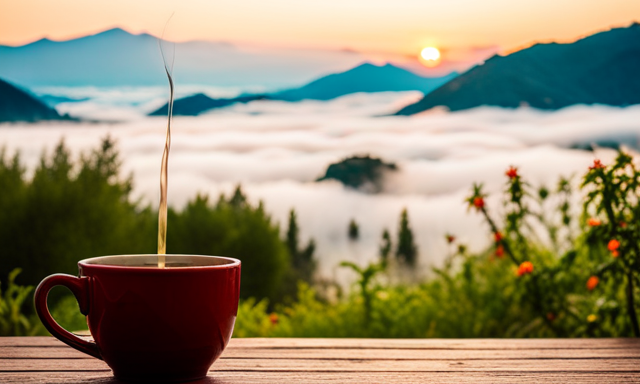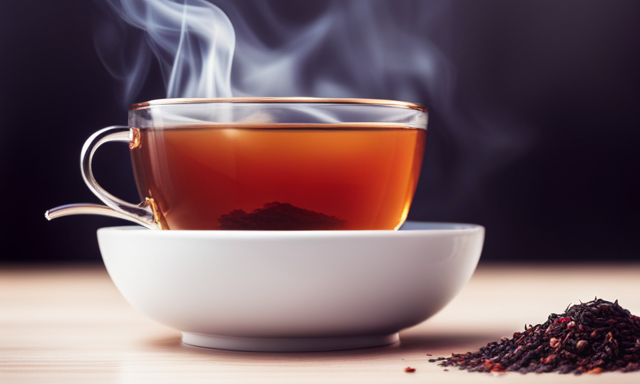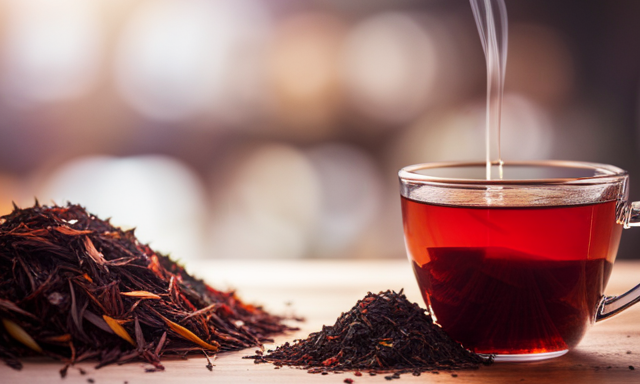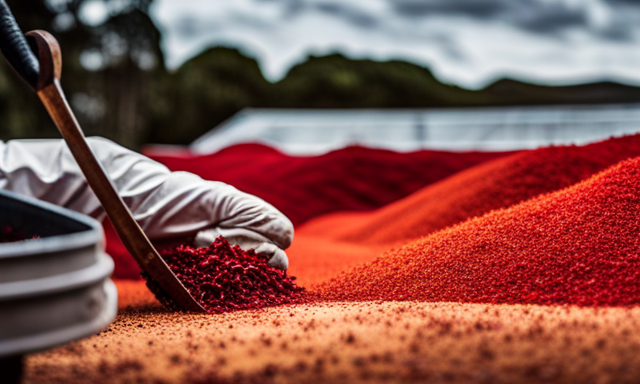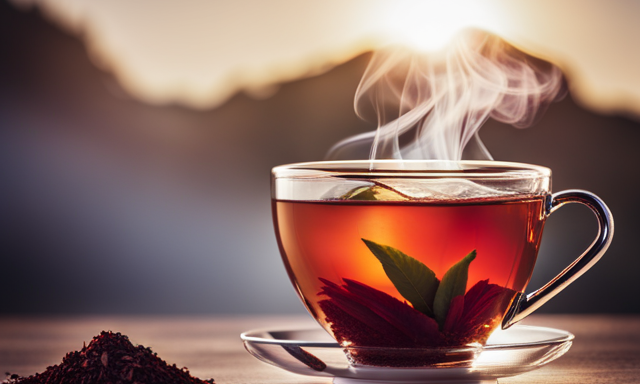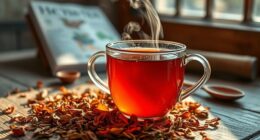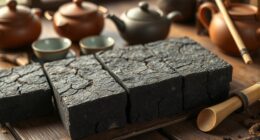As I sit here, sipping a cup of warm, aromatic tea, I am reminded of the vast world of flavors and traditions that this humble beverage encompasses. Assam, Darjeeling, and Rooibos – three names that evoke images of rolling hills, vibrant cultures, and centuries-old rituals. Just like the diverse landscapes they hail from, each of these teas possesses a unique character and allure.
Imagine yourself standing amidst the lush tea gardens of Assam, India, where the robust and malty Assam tea is harvested. Or picture the misty slopes of Darjeeling, where the delicate and muscatel flavors of Darjeeling tea are born. And then there’s Rooibos, a herbal tea from South Africa with its earthy sweetness and remarkable health benefits.
In this article, we will delve into the secrets of Assam, Darjeeling, and Rooibos teas. We will explore their different processing methods, brewing techniques, and popular varieties. We will also uncover the cultural significance and traditions surrounding these teas, and guide you on where to find and savor the best cups of Assam, Darjeeling, and Rooibos.
So grab your favorite mug, and let’s embark on a captivating journey through the world of tea.
Key Takeaways
- Assam tea is a strong and malty tea known for its high levels of antioxidants and health benefits for the heart and immune system.
- Darjeeling tea is a delicate tea with stunning views of the Himalayas, rich in antioxidants, and known for its exquisite taste and health benefits.
- Rooibos tea is a South African herbal tea that is naturally caffeine-free, high in antioxidants, and has soothing properties that aid digestion and promote healthy skin.
- Assam, Darjeeling, and Rooibos teas can be purchased from specialty tea shops or online retailers.
Assam Tea
Assam tea, with its rich and robust flavors, is a comforting and invigorating drink that’ll awaken your senses and leave you craving for more.
This exquisite tea comes from the lush and vibrant tea gardens of Assam, a region in northeastern India known for its exceptional tea production.
Assam tea is renowned for its strong, malty taste and deep, reddish-brown color. Not only does it provide a delightful drinking experience, but it also offers numerous health benefits.
Assam tea is packed with antioxidants, which can boost your immune system and improve your overall well-being. Additionally, it’s known to promote cardiovascular health and aid in digestion.
Now, let’s delve into the world of Darjeeling tea and discover its unique characteristics and flavors.
Darjeeling Tea
Originating in the picturesque hills of India, Darjeeling tea is renowned for its delicate and nuanced flavors. The cultivation of Darjeeling tea is a labor-intensive process, with each step carefully monitored to ensure the highest quality. The unique flavor profiles of Darjeeling tea are influenced by factors such as the altitude, soil, and climate of the region.
The tea leaves are handpicked, with only the youngest and most tender leaves being selected. This attention to detail results in a tea that is light and floral, with hints of muscatel and a subtle astringency. Darjeeling tea is often described as the ‘Champagne of teas’ due to its elegant and refined taste.
Transitioning to the subsequent section about Rooibos tea, this South African herbal tea offers a completely different flavor experience.
Rooibos Tea
If you’re looking to explore a new type of tea, consider trying Rooibos tea, which offers a distinct flavor experience that is unlike any other. Imagine sipping on a warm cup of Rooibos tea while enjoying a relaxing evening by the fireplace, its naturally sweet and earthy taste providing a comforting and soothing sensation.
| Benefits | Production Methods |
|---|---|
| Contains antioxidants that promote good health | Grown exclusively in the Cederberg region of South Africa |
| Caffeine-free, making it suitable for any time of day | Harvested by hand and undergoes a fermentation process |
| High mineral content, including calcium, magnesium, and zinc | Naturally dried in the sun before being ready for consumption |
| Known for its potential to alleviate allergies and skin conditions | No additives or preservatives are used in the production process |
Rooibos tea brings numerous benefits, including antioxidants that promote good health and a caffeine-free composition suitable for any time of day. It is grown exclusively in the Cederberg region of South Africa and undergoes a meticulous production process. Hand-harvested and naturally dried in the sun, Rooibos tea retains its natural flavors and healthful properties. Now, let’s delve into the differences in processing methods between Assam, Darjeeling, and Rooibos tea.
Differences in Processing Methods
Looking to explore the world of tea? Let’s delve into the fascinating differences in processing methods that create unique flavors and aromas.
When it comes to Assam, Darjeeling, and Rooibos teas, the variations in taste profiles are remarkable. Assam tea, known for its strong and malty flavor, undergoes a fully oxidized process, resulting in a bold and robust cup. On the other hand, Darjeeling tea is partially oxidized, giving it a lighter and more floral taste with hints of muscatel. Rooibos tea, native to South Africa, is entirely caffeine-free and undergoes a fermentation process, resulting in a sweet and nutty flavor.
Each tea also offers distinct health benefits, from the antioxidant-rich properties of Rooibos to the potential cardiovascular benefits of Assam and Darjeeling.
Now, let’s move on to brewing techniques and recommendations for a truly satisfying tea experience.
Brewing Techniques and Recommendations
Indulge in the art of brewing tea to create a truly satisfying and soul-soothing experience. When it comes to brewing techniques for Assam, Darjeeling, and Rooibos, there are some key factors to consider.
The brewing temperature and steeping time play crucial roles in extracting the best flavors from each type of tea.
For Assam tea, which is known for its robust and malty taste, it’s recommended to use boiling water at around 212°F (100°C). Let the tea steep for about 3-5 minutes to achieve a strong and full-bodied cup.
Darjeeling tea, on the other hand, requires a slightly lower brewing temperature. Use water that has cooled down to around 195°F (90°C) and steep the tea for 2-3 minutes. This delicate tea yields a light and floral flavor profile.
When it comes to Rooibos, it’s best to use boiling water and steep the tea for about 5-7 minutes. This South African herbal tea offers a naturally sweet and earthy taste.
By understanding the optimal brewing temperature and steeping time for each type of tea, you can unlock their unique flavors and aromas.
Transitioning to the next section about popular varieties and blends, let’s explore the diverse world of tea.
Popular Varieties and Blends
When it comes to popular varieties and blends of tea, there are a few key options that I always turn to.
First up, there’s the Assam Breakfast Blend, which is a robust black tea known for its malty flavor and rich aroma.
Then, there’s the Darjeeling First Flush, a delicate and floral tea that is harvested in the spring and is often referred to as the ‘Champagne of teas.’
Lastly, there’s Rooibos Chai and Herbal Infusions, which are caffeine-free alternatives that offer a range of flavors and health benefits.
These varieties and blends are all unique in their own way and provide a delightful experience for tea enthusiasts.
Assam Breakfast Blend
Assam Breakfast Blend is a popular and flavorful tea that combines the rich and robust flavors of Assam, Darjeeling, and Rooibos. This blend is carefully crafted to create a harmonious balance of taste and aroma.
When you brew a cup of Assam Breakfast Blend, you can expect the following sensory experience:
- The bold and malty notes of Assam tea estates, which add depth and character to the blend.
- The delicate and floral undertones of Darjeeling, providing a touch of elegance.
- The smooth and earthy flavors of Rooibos, known for its numerous health benefits.
Together, these ingredients create a truly unique and satisfying cup of tea that can be enjoyed at any time of the day.
Now, let’s move on to the next section and explore the wonders of Darjeeling first flush.
Darjeeling First Flush
Crafted from the first plucking of the season, Darjeeling First Flush offers a delicate and refreshing flavor profile that is highly sought after by tea connoisseurs, with an average yield of only 10,000 kilograms per hectare.
Known as the ‘Champagne of Teas,’ Darjeeling First Flush is grown in the picturesque hills of Darjeeling, India. The region is famous for its tea estates, and visitors can indulge in Darjeeling tea estate tours to witness the meticulous process of tea production.
Apart from its exquisite taste, Darjeeling First Flush also boasts numerous health benefits. Rich in antioxidants, this tea is known to boost metabolism, aid digestion, and improve cardiovascular health. It is also believed to have anti-inflammatory and stress-reducing properties.
Transitioning into the subsequent section about rooibos chai and herbal infusions, it is fascinating to explore the world of caffeine-free alternatives that offer unique flavors and health benefits.
Rooibos Chai and Herbal Infusions
After discussing the exquisite flavor and characteristics of Darjeeling First Flush, let’s delve into the world of Rooibos Chai and Herbal Infusions.
Rooibos, also known as ‘red bush,’ is a South African herbal tea that’s naturally caffeine-free and rich in antioxidants. This unique tea offers a multitude of health benefits, including improving digestion, boosting the immune system, and promoting healthy skin. Compared to black tea, Rooibos doesn’t contain tannins, making it a gentler option for those with sensitive stomachs.
Additionally, Rooibos has a naturally sweet and nutty flavor, which pairs perfectly with the aromatic spices used in Chai blends. This combination creates a comforting and warming beverage that’s both delicious and nourishing.
As we explore the cultural significance and traditions surrounding these teas, we’ll uncover the fascinating stories behind their origins and rituals.
Cultural Significance and Traditions
Assam Tea Gardens and Tea Tourism offer a unique experience for tea enthusiasts like me. With their vast tea plantations and rich history, these gardens provide a glimpse into the fascinating world of tea production. Exploring the lush green fields and learning about the intricate process of tea making is truly a treat for the senses.
Darjeeling Tea Estates not only produce exquisite tea but also offer breathtaking views of the Himalayas. As I sip on a cup of Darjeeling tea, I’m transported to a serene and picturesque landscape, surrounded by majestic mountains. The combination of the tea’s delicate flavor and the stunning scenery makes for a truly memorable experience.
Rooibos Tea holds a special place in South African culture as a traditional beverage. Its earthy and slightly sweet taste is both comforting and refreshing. As I enjoy a cup of Rooibos tea, I’m reminded of the rich history and vibrant traditions of South Africa.
Assam Tea Gardens and Tea Tourism
Located in the beautiful region of Assam, the tea gardens offer a wonderful opportunity for tea enthusiasts to indulge in tea tourism. Assam tea, known for its strong and malty flavor, is one of the most popular types of tea in the world.
The tea gardens in Assam are not only known for their exquisite tea production but also for their breathtaking landscapes. The lush greenery, rolling hills, and serene atmosphere create a perfect setting for a tea lover’s paradise.
Assam tea tourism allows visitors to explore the tea estates, learn about the tea-making process, and even participate in tea tasting sessions. It’s a truly immersive experience that gives a deeper understanding of the rich tea culture in Assam.
Moving on to the next section about Darjeeling tea estates and Himalayan views, visitors can also enjoy the mesmerizing scenery while sipping on a cup of Darjeeling tea.
Darjeeling Tea Estates and Himalayan Views
After exploring the beautiful tea gardens of Assam, I couldn’t resist continuing my tea adventure to the enchanting Darjeeling. Known as the ‘Champagne of Teas,’ Darjeeling tea is highly regarded for its delicate flavor and aroma.
Nestled in the foothills of the Himalayas, the Darjeeling tea estates offer breathtaking views of the majestic mountains. I found myself captivated by the lush green tea gardens, where the tea leaves are carefully handpicked and processed.
The region is not only famous for its tea, but also for its trekking opportunities in the Himalayas. The picturesque trails provide an exhilarating experience, with panoramic views of snow-capped peaks and verdant valleys.
As I prepared to leave Darjeeling, my mind was already buzzing with anticipation to discover yet another unique tea experience – the traditional South African beverage, Rooibos tea.
Rooibos Tea as a Traditional South African Beverage
You’ll be amazed by the rich cultural heritage and vibrant flavors of South Africa when you try the traditional beverage known as Rooibos tea. Here are some fascinating facts about this beloved South African drink:
-
Traditional brewing methods: Rooibos tea is made by steeping the leaves of the Aspalathus linearis plant in hot water for several minutes. This allows the rich, earthy flavors to infuse into the liquid.
-
Health benefits: Rooibos tea is known for its numerous health benefits. It’s naturally caffeine-free, making it a great choice for those looking to reduce their caffeine intake. It’s also rich in antioxidants, which can help boost the immune system and protect against oxidative stress.
-
Soothing properties: Rooibos tea has a calming effect on the body and is often used as a natural remedy for insomnia and anxiety. It’s also believed to aid digestion and promote healthy skin.
-
Versatile and delicious: Rooibos tea can be enjoyed hot or cold and can be flavored with various ingredients like lemon, honey, or mint. Its unique flavor profile is both refreshing and comforting.
Now that you know more about the traditional brewing methods and health benefits of Rooibos tea, let’s explore where to buy and enjoy Assam, Darjeeling, and Rooibos teas.
Where to Buy and Enjoy Assam, Darjeeling, and Rooibos Teas
To find the perfect cup of Assam, Darjeeling, or Rooibos tea, imagine yourself in a cozy café, surrounded by the aroma of freshly brewed teas and the soothing sounds of gentle conversation. When it comes to buying premium loose leaf teas, there are several options to consider.
Specialty tea shops often carry a wide selection of Assam, Darjeeling, and Rooibos teas, ensuring you have access to the highest quality blends. Online retailers also offer a convenient way to explore and purchase these teas from the comfort of your own home.
When it comes to health benefits, Assam tea is known for its high levels of antioxidants, which can promote heart health and boost the immune system. Darjeeling tea, on the other hand, is rich in polyphenols that may help reduce the risk of chronic diseases. Rooibos tea is caffeine-free and packed with antioxidants, making it a great choice for those looking for a soothing and hydrating option.
So, whether you prefer the bold flavor of Assam, the delicate notes of Darjeeling, or the earthy sweetness of Rooibos, there are plenty of places to find and enjoy these exquisite teas.
Frequently Asked Questions
What is the caffeine content of Assam, Darjeeling, and Rooibos teas?
Assam, Darjeeling, and Rooibos teas have varying caffeine content. Assam is robust with caffeine, Darjeeling is delicate, and Rooibos is caffeine-free. Comparing their caffeine content allows for a thorough health benefits analysis.
Are Assam, Darjeeling, and Rooibos teas suitable for people with dietary restrictions or allergies?
Assam and Darjeeling teas can be suitable for people with dietary restrictions or allergies, as they are typically made solely from tea leaves. These teas also offer various health benefits, such as antioxidant properties and potential weight management support.
How long does it take to brew Assam, Darjeeling, and Rooibos teas?
To properly brew Assam, Darjeeling, and Rooibos teas, steep them in hot water for 3-5 minutes. The best time of day to enjoy these teas varies depending on personal preference, but they are often enjoyed in the morning or afternoon.
Can Assam, Darjeeling, and Rooibos teas be consumed hot and cold?
Assam and Darjeeling teas can be enjoyed both hot and cold, allowing you to savor their distinct flavors in different ways. While Assam tea requires boiling water, Darjeeling tea is brewed with slightly cooler water. Rooibos tea, on the other hand, is naturally caffeine-free and is often enjoyed hot.
Are there any health benefits associated with drinking Assam, Darjeeling, and Rooibos teas?
There are several health benefits associated with drinking Assam, Darjeeling, and Rooibos teas. These teas are known for their antioxidant properties and are believed to improve digestion, boost immunity, and promote relaxation. To maximize their benefits, proper brewing techniques should be followed.
Conclusion
In conclusion, Assam, Darjeeling, and Rooibos teas each offer their own unique flavors and characteristics. Assam tea is known for its robust and malty taste, while Darjeeling tea is more delicate and floral. Rooibos tea, on the other hand, is caffeine-free and has a naturally sweet and earthy flavor.
Each tea requires different brewing techniques to fully enhance their distinct qualities. As the adage goes, "Variety is the spice of life," and exploring the world of these teas allows us to experience a diverse range of flavors and traditions.
So, grab a cup of your favorite tea and savor the rich tapestry of taste that awaits you.

